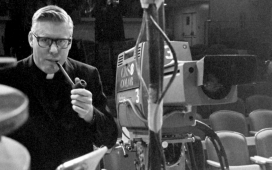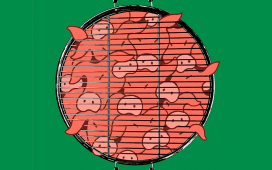As with other early LGBTQ+ rights organizations, like the Mattachine Society or the Daughters of Bilitis, it’s not always easy to judge a group’s influence by its present day size or activity. Beginning in the ‘70s, COYOTE provided legal assistance and sexual education to sex workers and sensitivity training to police and social service agencies — and it was instrumental in forcing elected officials to reckon with sex workers as human beings deserving of rights and protection. Newly visible, sex workers essentially came out of the closet, with St. James helping to pry open the door.
Patsy Chan, treasurer of SJI’s Board of Directors, knew St. James for over 50 years. As a teenager in Chinatown, Chan worked part-time at an answering service. St. James would come in once a month to pay the owner, a Mr. Wong, in cash.
“This answering service company actually served a lot of women of the night,” Chan says. “I never gave it any thought. You’d just take a message or connect them or whatever you needed to do. We got to talking and I said, ‘Maybe sometime we could have coffee at Cafe Trieste,’” a bohemian hangout in nearby North Beach.
What started out as a friend crush of sorts became a decades-long friendship. St. James invited Chan to meetings and events, including parties at the notorious hungry i nightclub that Chan was sometimes too young to go to. (“I was just in awe!” Chan says.) She became active in a number of causes in the late 1960s and early ’70s, among them women’s liberation. Her sister-in-law helped St. James keep her books, and when COYOTE was founded, Chan became a member — and never really left St. James’ orbit.
As an indication of how much the U.S. political system has shifted, St. James initially sought the presidency in 1980 — as a Republican. She later relocated to the South of France, returning to San Francisco a decade later to run for the city’s Board of Supervisors, a race she lost by only a few votes.
Recognizing her outsized presence, then-Mayor Willie Brown asked St. James what it was she wanted.
“She said, ‘I want a clinic! I want some place where I can take care of my girls,’” Chan recalls. “30 or 40 years ago, I started working with organizations, mostly in Chinatown, but my heart was always with Margo. I was not a street walker or a sex worker, but I believed in what she did. One day, she said to me, ‘I don’t want you to leave me. You’re the only one that understands all us crazy girls and you’re the straightest person here. I want you to stay on the board to keep us all in check.’”
As the sexual revolution birthed a subsequent upheaval in the understanding of gender identity, SJI has become a leader in “peer-based occupational safety and health” for sex workers of all genders — along with bodywork providers, adult film actors, BDSM workers, their partners and their children. Chan considers St. James’ proudest moment to be a sea change in the perception of sex workers and why they do what they do. It’s not because they want to be whores, she says; it’s often because they have people to take care or they have to survive while putting themselves through school.
“Margo wanted to make sure these girls got recognized, and that there’s a purpose to it,” Chan says.
In San Francisco, the world’s oldest profession has since acquired sufficient respectability that SJI works with the Mayor’s Office of Housing, receives grants from the Levi Strauss Foundation, and entrusted some of COYOTE’s papers to Harvard. It was a long road, with some curious bends.








